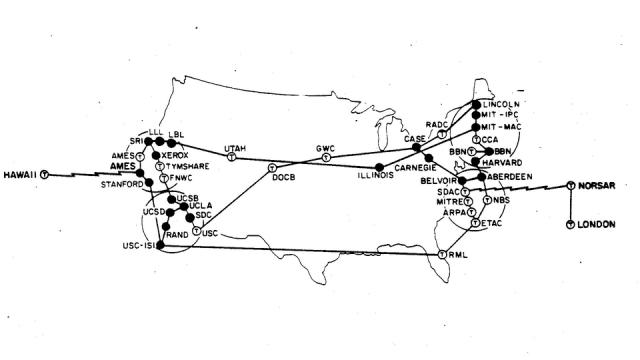Thanks to recent confirmation that your every online move is being monitored, trust in the internet seems like it’s at an all-time low. In fact, as we can see from an article published in 1973, we were acutely aware that the future of our interconnected world depended on confidence in the privacy and security of the network before it even existed.
The Christian Science Monitor published an article in 1973 (which then appeared in various newspapers around the country) that looked at the potential for this new network called the ARPANET. The network was the precursor to our modern internet and was still overseen by the government. In 1973 the ARPANET was only officially open to researchers and government agencies, a policy that remained intact until the privatization of the backbone network that occurred in the late ’80s and early ’90s.
The 1973 article predicts a future filled with online banking, high-tech libraries, and worldwide communication — all activities that would fail miserably if people didn’t trust that they had some semblance of privacy.
Below is an excerpt of what was published in the January 30, 1973 edition of the Des Moines Register in Iowa under the headline, “New Computer Network May Revolutionise the Future.” Emphasis mine.
A newly developed computer communications network may revolutionise the future, experts say. The average citizen may be able to call up a computer which will instruct him or give him money from his bank account.
And the system may help the United State’s balance of trade by providing an international market for U.S. know-how.
When extensive commercial networks are established, computer service costs may be cut by two-thirds, says Dr. Lawrence Roberts of the Advanced Research Projects Agency (ARPA) of the Department of Defence. The system, developed by ARPA and called Arpanet, will enable many more people efficiently to use capabilities of the largest computers in the nation by linking the computers together in new ways.
Many people are concerned about the threat that these systems may present to security and individual privacy. But those working on Arpanet feel these problems can be solved, and the solutions may not be very expensive if they are only taken into consideration from the very beginning.
Five years from now banks may be interlinked so an individual will be able to draw on his private account from anyplace in the world. Lending systems between libraries may be greatly expanded. Reams of paper work may be stored and transmitted by computer.
“The potential of the United States is no longer in steel and hard commodities but in ideas,” says Dr. Roberts.
In the last 10 months the amount of traffic on the net has increased tenfold.
One of the biggest challenges facing the commercial internet in the 1990s was a lack of trust. But it was a slightly different kind of trust than we often think about today, in a post-Snowden world. Average people of the 1990s were discovering that this newly privatized network had enormous potential. But how could they trust the internet with their credit card numbers? How could they know that the people they were interacting with were who they said they are?
It took years to establish the kind of trust in the internet that evolved in the first decade of the 21st century. Today, most people don’t think twice about buying things online. For the most part, we trust cloud services with our private data.
We now see much of that trust now eroding. And people are beginning to change their online behaviour as a result. Trust is essential to the future of the internet, just as it was in 1973. We can’t say we weren’t warned.
Image: ARPANET map from 1973 from the ARPANET Completion Report, Bolt, Beranek and Newman, Burlington, MA, January 4, 1978 via ARPANET Maps Online
